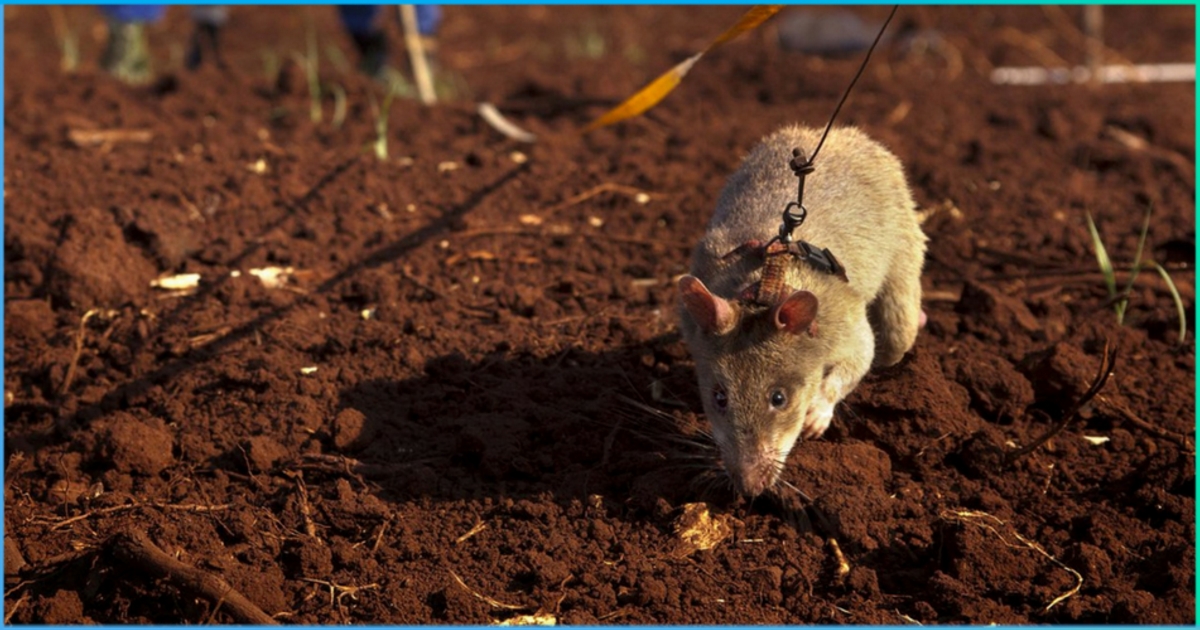
Rats Sniff Out Landmines And Save Thousands Of Lives In Africa & Asia, Also Detect Tuberculosis
21 Sep 2018 2:34 PM GMT
Be it farmer Marusa from Mozambique, former soldier Lann Sa from Cambodia or the students of a school in João, Angola – all of their lives resemble in one aspect, despite living worlds apart – as survivors in these post-conflict nations, living in close proximity to landmine fields had been the norm of their lives. While minefields restricted Marusa’s village from accessing clean water and fertile lands, Lann Sa had lost his right leg when he stepped on a live landmine one morning during the war. For the students in João, it was hard to keep them off the boundaries of the minefield, barely 20 metres from the children’s playground.

With the efforts of Belgian NGO Apopo, now their areas have been cleared of landmines, credits to a group of unlikely heroes – African pouched rats. In the past few years, Apopo’s HeroRATs have detected over 107,753 landmines, saving nearly 10 lakh lives in the process. In addition, these rats can also detect tuberculosis in patients at a rate faster than lab technicians.

One wrong step can cost a life
Miles and miles of minefields plague the daily lives of people in over 78 war-ravaged countries of the world, mainly in Africa and Asia, as reported by BBC. Every year, an estimated 15,000 to 20,000 people are killed or maimed by landmines, as per UNICEF, and children constitute a major percentage of the casualties as they are more likely to unknowingly step on live landmines or unexploded ordnance (explosives that still pose a risk to detonate).

Huge amounts of money have already been spent by top global research institutes to discover newer technology for mine detection like laser detectors, Nuclear Quadrupole Resonance, thermal image processing etc. However, it is near impossible for underdeveloped countries to install such expensive state-of-the-art devices to solve their mine crisis. Also, one single device is unable to detect landmines in a variety of geographical terrains – from sand deserts to forest beds.
Rodents to the rescue
At such a juncture, Apopo emerged in the scene with their specially trained HeroRATs, officially known as Mine Detection Rats (MDRs), who performed the demining operations much quicker than regular existing methods.
HeroRATs came into being around 2000 as a brainchild of Apopo founder Bart Weetjens, who was researching solutions for the global landmine problem. He already had a few pet rodents when the unique idea struck him, fascinated by the scent detection ability of his pets. A few years of training and research later, the first batch of HeroRATs was deployed at a minefield in Tanzania, Africa where they effectively identified all the hidden explosives.
Today, Apopo HeroRATs are being used in countries like Angola, Zimbabwe, Cambodia, Mozambique, Vietnam, Colombia, Thailand and more.

From a nuisance to a saviour
For farming communities, field rats are nothing but a nuisance who can destroy their produce overnight. Apopo has utilised the heightened sense of smell of these rats and turned a bunch of wild beasts into lifesavers.
Rats are basically nocturnal creatures who are near-blind at daytime when they seek out food using only their sense of smell. So, at Apopo laboratory, the rats receive training for over nine months where they are exposed to odours of TNT and other explosives for a long time. Once the rats are expert in identifying an explosive smell, they have to pass a blind test for field training. Only the highly successful ones with less than 2% error rate are actually taken to live minefields.

Each rat is attached to a harness which is controlled by Apopo staff as it is deployed in action. After it sniffs out a landmine, it scrapes the soil in that zone with its feet, where the bomb is removed later by a human team. After each correct detection, the rat is rewarded with a tasty treat.
The pocket-sized heroes
The HeroRATs are so well-trained that they can detect mines with more accuracy than a metal detector since the latter often give false signals at metal scraps. They can even detect plastic landmines which often fail to show any signal in advanced detectors. In one day, these small creatures can scan an area which a human deminer covers in 2 weeks. Weighing less than 5 kg, a rat stands no chance of setting off a landmine, unlike humans or dogs.
In Cambodia, where children account for 50% of landmine-induced casualties, the HeroRATs are working alongside mine-detection instruments, making the work fast and highly effective.

If you are wondering on the lines of animal rights violation, it must be clarified here that at Apopo, the rats are treated in the most ethical manner. A considerable amount of money (around 100 euros per month) is spent on each rat throughout its lifespan, including training and maintenance.
HeroRATs can also detect Tuberculosis
In Tanzania, Mozambique and Ethiopia, where Tuberculosis claim many lives each year, the HeroRATs are being used to assist clinical technicians in detecting the disease in human saliva samples. They have proven to be even more accurate than some clinical results, finding traces of the bacteria in samples already declared ‘negative’ by the clinic. “One rat can check a hundred samples in less than 20 minutes, a task that would take a lab technician up to 4 days,” states the Apopo website.

Apopo’s CEO Christophe Cox said to BBC, “I’m really confident with the promise of the rats, and the potential impact which we can make. We have to continue researching and publish and convince the policymakers.”
Also Read: Chennai Group Rescues Hundreds Of Stranded Animals In Kerala, Risking Own Lives
 All section
All section













